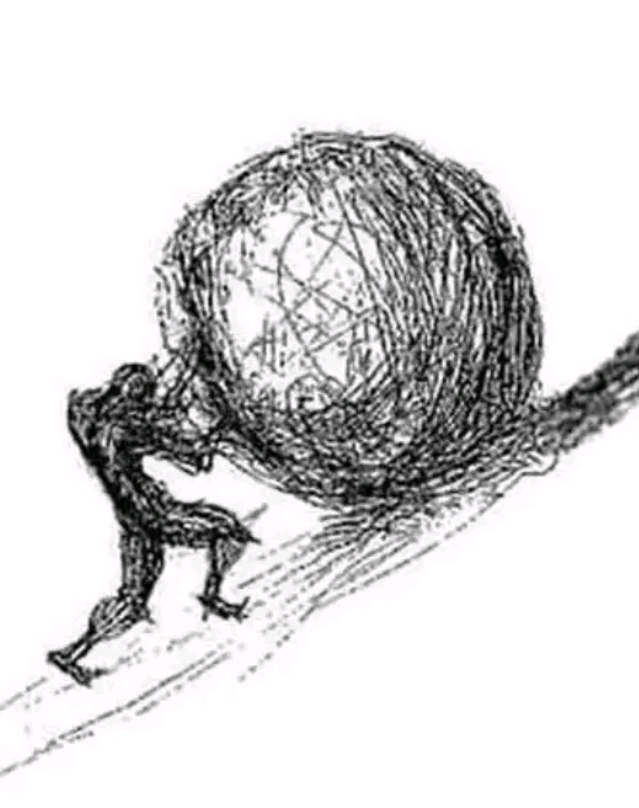Obviously it’s a process that is always brewing under capitalism but you know what I mean. Do you think we are close, like within 5 to 10 years close to a major declaration of war between the imperial core and the periphery or something of the sort? Would you argue it’s already started?
I see Palestine liberating itself, I see solidarity with them along the people, I see the ripples that the Ukraine conflict has started, I see more and more revolutionary sentiment building. Could be an experience bias because now I’m more involved in real life so I see it more, but things just seem to be accelerating and I’m here for it. Much work needs to be done to capitalize and educate/funnel us all towards a progressive revolution and not a reactionary one, but I’m ready


Yeah. The problem with predicting timeframes is that all these gradual, quantitative changes result in qualitative changes (that is, sudden fractures) which make it difficult to give estimates. The gradual march of NATO’s army eastward in their military offensive against Russia over the last three decades, conquering Eastern Europe as they went, led to the sudden faultline of Ukraine activating. That there might have been an event like this at some point, in some place, between Russia and NATO was perhaps predictable - but the time and place and result was not as predictable. Similarly, in Palestine, that there might have been some existential battle between the Zionists and the Palestinians might have been predicted, but the time and place was not so (regardless of how much Israel copes that they actually saw the attack coming), especially because Hamas didn’t even tell their closest allies they were going to attack in order to preserve the surprise element as much as possible.
In geology, there’s two dueling concepts of uniformitarianism and catastrophism. The first assumes that the natural world around us is formed by gradual, small-scale processes, like the erosion of a beach and the slow construction of a mountain range. The second assumes that instead, short, large and violent events are more important - a meteorite crashing into the Earth, or a supervolcano erupting, or a massive flood. While uniformitarianism pretty handily won the debate overall, it would be folly to say that occasional violent events haven’t been extremely important. The meteorite that ended the dinosaurs fundamentally changed the Earth’s biosphere, and was essentially totally disconnected from the Earth system. Even inside the Earth system, when Lake Agassiz in North America released its massive quantities of water into the ocean about 10,000 years ago, global sea levels rose relatively quickly by up to 10 feet and disrupted oceanic currents and possibly resulted in temporary cooling, with all the knock-on impacts that had on the Earth and humanity.
World events work similarly to geology, though obviously on a much smaller timeframe. The world, its nations and corporations chug on, day to day. Sudden events from both outside and within the system - sometimes predicted in advance - can have massive and fairly unpredictable impacts and lead to major changes. The United States may not have been able to take its position as the quasi-hegemon if not for the World Wars, and while a great European conflict was predictable beforehand, all the effects it would go on to have - the fall of the Russian Empire and the rise of the USSR; massive changes in the Middle East; the eventual end of colonialism; etc - were much, much less predictable. If you were in 1910 and decided to merely plot the gradual effects that you expected capitalism to have on the world and said “Well, according to my model, capitalism will end in 2142 due to the tendency of the rate of profit to fall and an inability for imperialists to continue governing the world. It seems that the British Empire’s apex will continue for another few decades and perhaps steadily decline all the way to the 2100s, based on comparisons with the Roman Empire…” then you would be mighty shocked when just 10 years later, Europe was on the brink of a communist revolution.
So, for that reason, I find time estimates rather unhelpful. Like many others, I have talked about how the US probably has a few decades left as an empire - and that might very well be true - but this is assuming a gradual decline without sudden events. If you’d have told me just in 2020 that the US of three years from then would be unable to protect shipping routes through the Red Sea from Yemen despite having two/three aircraft carriers and various other naval assets throughout the region, I would have said that you’re bonkers. If you’d have told me that Russia was almost singlehandedly taking on the combined might of NATO in a proxy war and not only winning, but winning very convincingly, I would have said “There’s no way that they’re actually fighting without nukes dropping, and how could Russia resist NATO anyway, given all their problems?” If you’d have told me pre-October 7th that Israel would very soon be in the worst crisis in its history due to mostly the efforts of Gaza, I would have been like “Well, that’s a nice thought, but we can’t really expect the population of a concentration camp to be able to resist their prison guards to that extent.” God knows what sudden events will happen this year.
I definitely get and agree with what you’re saying. There is, of course, no way to reliably predict any of this. Sometimes I just like to try to call the shots when I have a feeling something, erm… QUALITATIVE is about to happen, lol
That is brilliant and hope-filling.